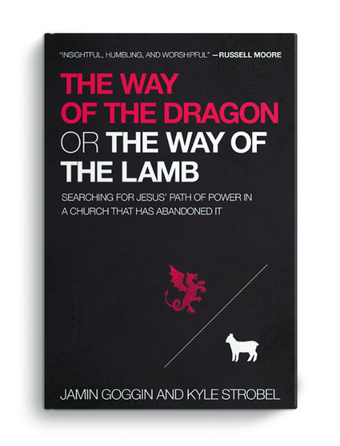
The 2016 U.S. election sparked new discussions about the political power and influence of American Christians. Should Christians seek power in government and other worldly spheres of influence? Or are the temptations of earthly power antithetical to the “power in weakness” approach we see in the New Testament? Has the church abandoned Jesus’ view of power?
In their new book, The Way of the Dragon or the Way of the Lamb, pastor Jamin Goggin (’03, M.A. ’08) and Kyle Strobel (M.A. ’02, M.A. ’05), assistant professor of spiritual theology and formation at Talbot School of Theology, explore some of these questions. Featuring interviews and insights from Christian leaders like J.I. Packer, Marva Dawn, John Perkins, Eugene Peterson and Dallas Willard, the book challenges believers to adopt a more Christ-like understanding of where power comes from and what it is for.
Biola Magazine recently sat down with Goggin and Strobel to discuss the book and how Jesus redefines power, success and privilege.
In America we have this value of the self-made success story, a rags-to-riches mythology where you can come from nothing and “make something of yourself.” Is there anything good we can glean from this as Christians? Or is this just a story of worldly power?
STROBEL: I think the good in it is usually when the telos has a virtue tied to it. For example, it may not be “I want to be greedy” as much as “I want to make a lot of money so that I can give, so that I can bless.” Usually there is a “so that,” which is virtuous. The problem is the entire structure of this is so wedded to a fleshiness and a worldliness and a view of success that is tied to power from below. That will almost always warp it. The biblical image that strikes me is that we try to sow in the flesh and reap in the spirit. And that’s always folly. I think this kind of “self made” power is just fleshly autonomy. We’ve allowed ourselves to ignore sinful autonomy for the sake of a greater good.
GOGGIN: In the kingdom of God, the ends do not justify the means. But it’s a temptation. In the church, it can be language like this: “Well, more people are coming to Christ; more people are being baptized. Whatever we need to do to keep this going, so be it.” But as Dallas [Willard] has said, we’re not just called to do “Jesus things,” but to do them Jesus’ way. Surely the means matter in the kingdom. In kingdom terms, a curving inward to the self in order to “get things done” is antithetical to the way of Jesus. Jesus says it very clearly: “Apart from me you can do nothing.”
How should Christians think about our strengths in a healthy way, and how should we think about our weaknesses?
GOGGIN: For us, the axiom of embracing power in weakness is incredibly important. It means I don’t reject the fact that I have certain gifts or talents or abilities. I don’t seek to eschew those. But how I hold them and steward them is grounded in a deeper reality that they have been given to me by God, and that I am fundamentally frail and finite and fragile. On top of that, left to my own devices, these things are actually of no benefit to the kingdom and can actually be harmful to people. But if embraced in an abiding relationship with God and a fundamental posture of dependence and trust and need, now I can move forward in stewarding these things in a faithful way, for kingdom purposes.
You explore Henri Nouwen’s idea of “downward mobility” in the book. How would you advise a new Biola graduate when it comes to living out downward mobility? How does that fit with “impacting the world for Christ”?
GOGGIN: So much of the narrative is, “What does it mean to have big faith? To do big things for the kingdom?” And there’s something in that which is really good. And yet, in a generation that is perhaps more prone to grandiosity and a “you can do anything” mindset, I think actually the greatest faith is often found in whether we actually believe and trust that courageously faithful and heroic acts that no one will ever see or know about really do matter, and that God is at work in this. ... Often for the heart that is prone to grandiosity, the greatest act of faith is, “Are you willing to be faithful in the little things and embrace a life of hiddenness?”
STROBEL: There may be two or three people globally from our generation who will be remembered, history tells us. It’s probably not going to be any of us. If it is, praise God. If it isn’t, praise God. That has to be our approach. Lord, whatever you have for me, praise God. We haven’t heard that very much. We’ve heard “It could be you!” No it won’t, but praise God anyway. In fact, in the kingdom it is the hidden things that will be more honored. But we still don’t think that.
The hiddenness question is a huge one in our age of “platform.” Some people argue that a huge platform is good for the sake of mission, that it’s not about pride as much as pragmatic tool to reach the most people. Is a big audience or platform inherently a bad thing?
GOGGIN: It’s really an issue of the heart. We want to avoid the simple formula of “Don’t do social media. Don’t write books. Always say no to offers to speak to big crowds.” The question we want to go back to is, “Where do you believe power comes from and what is it for?” The truth is, I have been in very small churches and taught in youth groups of 30 students, and grandiosity is still a temptation of the heart. Leading in ministry for the sake of recognition or power or being viewed in a certain way can still be just as palpable as if it were a room of 5,000.

Some younger Christians have a sort of shame about the church. They see power in relevance, and they don’t think the church is relevant. This gives rise to the temptation to make church cool. What would you say to younger Christians who may be ashamed of the hidden, unexciting, seemingly “irrelevant” aspects of church?
STROBEL: We have to recover the mundane. This is why I think this generation is so removed from the church. The church doesn’t feel like it works. In our worldly power system the church is really stupid. It just does not make sense. So we’re seeing the result of this. If the church doesn’t make sense, let’s change the church, because they’re trying to interpret it in worldly frameworks.
I think of Paul’s expression in Galatians of “do not grow weary of doing good” (6:9), and the idea of “you will bear fruit in its season.” The problem with the desire for relevance is that it’s a desire to not have to be patient. There’s an immediacy to it. We don’t come up with a definition of power and relevance and then apply it to the church. Theologically that’s false. We recognize that in the kingdom, this is power and the acts of the church lay shame to the powers and principalities. If my view of power can’t make sense of coming to the Lord’s table and being weak, as an act to stand against evil, the problem is with my understanding of power and relevance and importance and success.
What can churches do to ensure a healthy rather than toxic leadership culture?
STROBEL: One of the biblical commands that we often just ignore outright is also the only biblical command that encourages competition: that you should “outdo one another in showing honor” (Rom. 12:10). We’re much more interested in outdoing one another in receiving honor. We’re very uninterested in outdoing one another in showing honor. I think that means if we’re looking for an elder or pastor, we look for the kind of person who outdoes other people in showing honor, not receiving honor. Right now we have a lot of people who clamor for power, and so we call them leaders. But in the kingdom these are people we should worry about.
Jamin Goggin (’03, M.A. ’08) has been in pastoral ministry for 11 years, and currently serves as a pastor at Mission Hills Church in San Marcos, Calif. He holds two master’s degrees and is currently earning a Ph.D. in systematic theology. Kyle Strobel (M.A. ’02, M.A. ’05) is a professor of spiritual theology and formation at Biola’s Talbot School of Theology. He holds a Ph.D. from the University of Aberdeen and has published numerous popular and academic books and articles.
 Biola University
Biola University.jpg)

